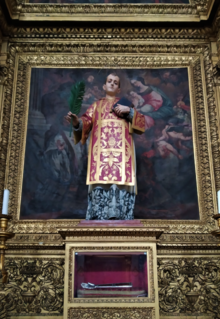Martyrs of Córdoba
[1][2][3] The hagiographical treatise written by the Iberian Christian and Latinist scholar Eulogius of Córdoba describes in detail the executions of the martyrs for capital violations of Islamic law (sharīʿa), including apostasy and blasphemy.[1][2][3] The martyrdoms recorded by Eulogius (the only contemporary source) took place between 850 and 859 AD,[4] which according to the Mālikī judges of al-Andalus broke the treaty signed between Muslims and their Christian subjects.Some of the Christian martyrs were executed for apostasy and blasphemy after they appeared before the Muslim authorities and insulted the Islamic prophet Muhammad, although there was a minority case in which some of them were accused of such violations by witnesses.[5] In 711 AD, a Muslim army of Moors from North Africa had invaded and conquered the territories that previously belonged to the Visigothic Kingdom, which comprised the Christian Iberia.When the Umayyad caliphs were deposed in Damascus in 750 AD, the dynasty relocated to Córdoba, ruling an emirate there; consequently the city gained in luxury and importance, as a center of Iberian Muslim culture.Christians also had to abstain from any public displays of their faith in the presence of Muslims, as such an act was considered blasphemy under Islamic law and punishable by death penalty.Still others converted in order to gain economic and political favors or to avoid the jizya tax, and thus the number of Christians in Al-Andalus shrank eventually to small proportions.[2][3] He composed tractates and martyrologies, of which a single manuscript, containing his Documentum martyriale, the three books of his Memoriale sanctorum, and his Liber apologeticus martyrum was preserved in Oviedo, in the Christian Kingdom of Asturias, located in the far Northwestern coast of Hispania.


CórdobaAl-AndalusAbd ar-Rahman IIMuhammad I of CórdobaDecapitationOrthodox ChurchRoman Catholic ChurchAurelius and NataliaEulogiusPerfectusSisenandusRoderickHistory of Al-AndalusMuslim conquestBattle of GuadaleteSiege of CórdobaBattle of ToulouseBattle of ToursFihridsUmayyad state of CórdobaAbd al-Rahman IAbd al-Rahman IIIAl-Mansur Ibn Abi AamirAlmoravid ruleBattle of SagrajasAlmohad ruleBattle of Las Navas de TolosaEmirate of GranadaNasrid dynastyBattle of the StraitGranada WarIberian PeninsulaReconquistaPortugalConvivenciaChristian martyrsMuslimhagiographical treatiseEulogius of Córdobacapital violationsIslamic lawapostasyblasphemyMālikījudgesIslamic prophetMuhammadfornicationIslamic death penaltyEarly Middle AgesMuslim armyNorth Africainvaded and conqueredVisigothic KingdomChristianIberiaTariq ibn-ZiyadGibraltarUmayyad caliphsDamascusapostasy from Islamcapital offensesIslamic religionPeople of the BookdhimmiSamaritansGnosticsMandeansZoroastrianskharajNorthern SpainSierrasgreat mosque of CórdobaAbd al-Rahman IIMuhammad IChristian faithOviedoKingdom of AsturiasAlvarusBartolomé Esteban Perez MurilloBaeto-RomanVisigothicSeptimaniaHispania BaeticaJustinian ISaint SisenandusCathedral of St. James the Great, BejarelicsFlora and MariaThese two womenAlcaláBerberAsturiasGuadalquivirfeast dayMartosSynaxaristesEastern Orthodox ChurchApril 30George, Aurelius and NataliaAurea of CórdobaSaint LauraNunilo and AlodiaPelagius of CórdobaPrinceton, New JerseyWoodstock, OxfordshirePrinceton University PressComparative Literature StudiesPhiladelphia, PennsylvaniaPenn State University PressJournal of Early Christian StudiesBaltimore, MarylandJohns Hopkins University PressThe Hispanic American Historical ReviewDurham, North CarolinaDuke University PressConference on Latin American HistoryLeidenBostonBrill PublishersStillman, Norman A.PhiladelphiaJewish Publication SocietyRunciman, StevenA History of the Crusades, Volume 1: The First Crusade and the Foundation of the Kingdom of JerusalemCambridge